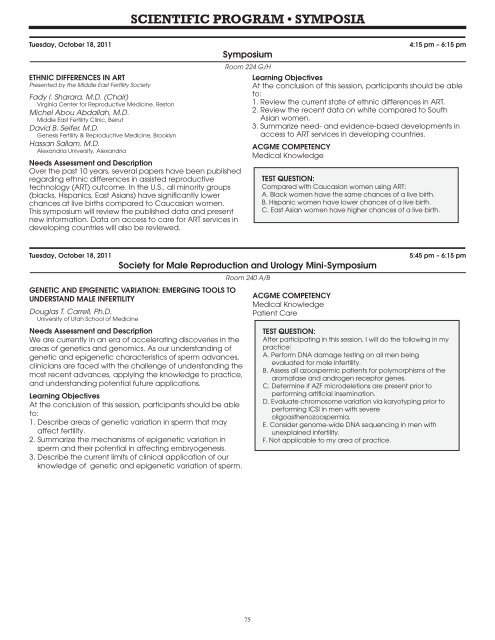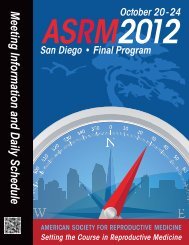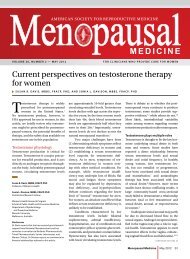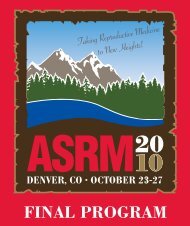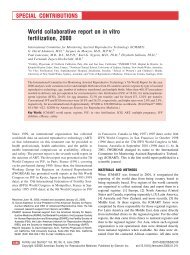scientific program • symposia - American Society for Reproductive ...
scientific program • symposia - American Society for Reproductive ...
scientific program • symposia - American Society for Reproductive ...
Create successful ePaper yourself
Turn your PDF publications into a flip-book with our unique Google optimized e-Paper software.
ETHNIC DIFFERENCES IN ART<br />
Presented by the Middle East Fertility <strong>Society</strong><br />
Fady I. Sharara, M.D. (Chair)<br />
Virginia Center <strong>for</strong> <strong>Reproductive</strong> Medicine, Reston<br />
Michel Abou Abdallah, M.D.<br />
Middle East Fertility Clinic, Beirut<br />
David B. Seifer, M.D.<br />
Genesis Fertility & <strong>Reproductive</strong> Medicine, Brooklyn<br />
Hassan Sallam, M.D.<br />
Alexandria University, Alexandria<br />
SCIENTIFIC PROGRAM <strong>•</strong> SYMPOSIA<br />
Tuesday, October 18, 2011 4:15 pm – 6:15 pm<br />
Symposium<br />
Room 224 G/H<br />
Needs Assessment and Description<br />
Over the past 10 years, several papers have been published<br />
regarding ethnic differences in assisted reproductive<br />
technology (ART) outcome. In the U.S., all minority groups<br />
(blacks, Hispanics, East Asians) have significantly lower<br />
chances at live births compared to Caucasian women.<br />
This symposium will review the published data and present<br />
new in<strong>for</strong>mation. Data on access to care <strong>for</strong> ART services in<br />
developing countries will also be reviewed.<br />
75<br />
Learning Objectives<br />
At the conclusion of this session, participants should be able<br />
to:<br />
1. Review the current state of ethnic differences in ART.<br />
2. Review the recent data on white compared to South<br />
Asian women.<br />
3. Summarize need- and evidence-based developments in<br />
access to ART services in developing countries.<br />
ACGME COMPETENCY<br />
Medical Knowledge<br />
TEST QUESTION:<br />
Compared with Caucasian women using ART:<br />
A. Black women have the same chances of a live birth.<br />
B. Hispanic women have lower chances of a live birth.<br />
C. East Asian women have higher chances of a live birth.<br />
Tuesday, October 18, 2011 5:45 pm – 6:15 pm<br />
<strong>Society</strong> <strong>for</strong> Male Reproduction and Urology Mini-Symposium<br />
GENETIC AND EPIGENETIC VARIATION: EMERGING TOOLS TO<br />
UNDERSTAND MALE INFERTILITY<br />
Douglas T. Carrell, Ph.D.<br />
University of Utah School of Medicine<br />
Needs Assessment and Description<br />
We are currently in an era of accelerating discoveries in the<br />
areas of genetics and genomics. As our understanding of<br />
genetic and epigenetic characteristics of sperm advances,<br />
clinicians are faced with the challenge of understanding the<br />
most recent advances, applying the knowledge to practice,<br />
and understanding potential future applications.<br />
Learning Objectives<br />
At the conclusion of this session, participants should be able<br />
to:<br />
1. Describe areas of genetic variation in sperm that may<br />
affect fertility.<br />
2. Summarize the mechanisms of epigenetic variation in<br />
sperm and their potential in affecting embryogenesis.<br />
3. Describe the current limits of clinical application of our<br />
knowledge of genetic and epigenetic variation of sperm.<br />
Room 240 A/B<br />
ACGME COMPETENCY<br />
Medical Knowledge<br />
Patient Care<br />
TEST QUESTION:<br />
After participating in this session, I will do the following in my<br />
practice:<br />
A. Per<strong>for</strong>m DNA damage testing on all men being<br />
evaluated <strong>for</strong> male infertility.<br />
B. Assess all azoospermic patients <strong>for</strong> polymorphisms of the<br />
aromatase and androgen receptor genes.<br />
C. Determine if AZF microdeletions are present prior to<br />
per<strong>for</strong>ming artificial insemination.<br />
D. Evaluate chromosome variation via karyotyping prior to<br />
per<strong>for</strong>ming ICSI in men with severe<br />
oligoasthenozoospermia.<br />
E. Consider genome-wide DNA sequencing in men with<br />
unexplained infertility.<br />
F. Not applicable to my area of practice.


